We use cookies to ensure that we give you the best experience on our website. If you continue to use this site we will assume that you are happy with it
Can Someone Run a Background Check Without My Permission? (Yes & No)
 Written by Background Check Repair
Written by Background Check Repair
Background Checks | May 31, 2024
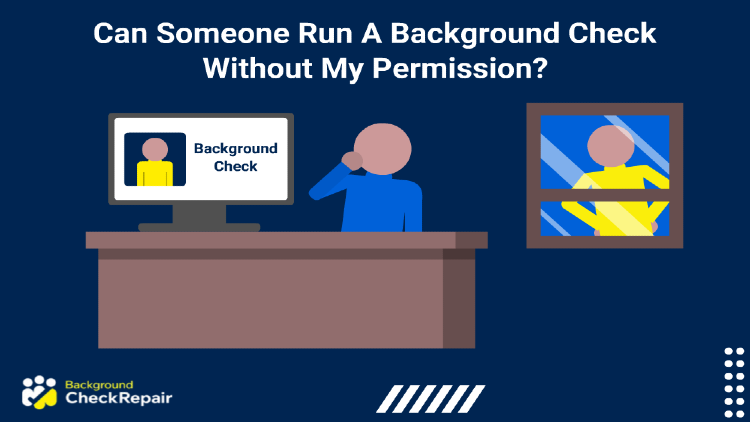
Table of Contents
Thanks to the internet, information is more readily available than ever before, leading many people to wonder, “Can someone run a background check without my permission?” Depending on the reason for the background check, the answer to this question can be either yes or no. And, knowing the facts about when to do a background check on someone (or when they can do one on you) can help prevent legal liabilities and costly mistakes.
When applying for a job, volunteer position, or a new apartment, a background check is often required. However, depending on the state where the search is being performed, there are different rules governing who can look into whose background, and what this information can be used for. These rules are designed to protect both the individual running the check and the person whose background is being investigated.
Typically, when looking into someone’s background for official and professional reasons, such as applying for a job, consent is legally required. On the other hand, when looking into someone’s background for personal reasons, such as dating, permission is not typically required by law.
Due to the many reasons for conducting a check, it can be difficult to understand which requires permission because there are some gray areas between personal and professional reasons. However, it is very important to know these distinctions, since in some instances, failing to seek consent before a screening can result in legal repercussions, such as a lawsuit.
If you’re still wondering, “Can someone run a background check without my permission?” the following information will remove the guesswork, so you can be assured you’re obeying the law before looking into someone’s background.
What About Employment Background Checks? Do I Need To Provide Consent for Potential Employers To Look Into My Background?
Criminal background checks are a common part of the employment process. This is especially true if you are applying for a job that handles confidential information, works with vulnerable populations, is responsible for financial transactions, and other tasks that rely on trustworthiness. And these history searches require your permission because they are used for professional reasons.
According to a survey conducted by the US Equal Employment Opportunity Commission, as many as 92% of employers request to run background checks on their employees. This is because employers want to prevent fraud, theft, and related problems that can endanger other employees, customers, or the integrity of the organization. Furthermore, employers also conduct checks to reduce their chances of being held liable for negligent hiring.
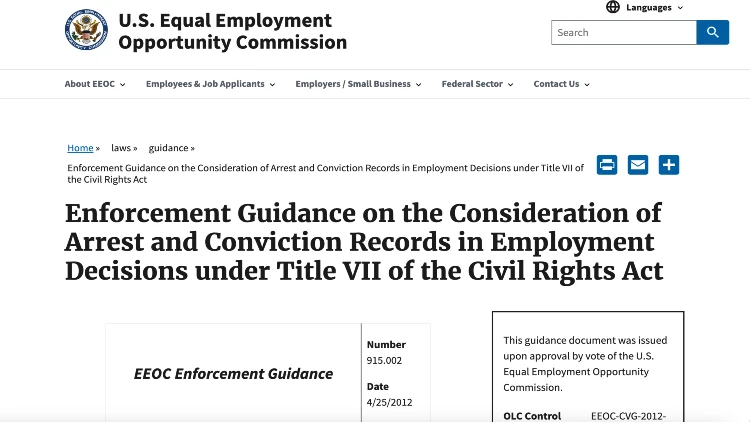
(Image: U.S. Equal Employment Opportunity Commission6)
As stated, certain occupations require background checks more often than others. For example, professions such as teachers and daycare workers often require a criminal check, since their work involves children, elderly persons, and other vulnerable groups, and the same is true for nursing records checks. Typically, job applicants will pass a background check and be cleared for these positions as long as they don’t have any infractions more severe than a minor traffic violation, or any infractions related to violence.
Many states also have requirements for background checks to be run on individuals working in positions of trust. These situations may include financial matters like payroll, transfers of bank account funds for clients, or working as a security guard. For example, in the state of Florida, a background check must be run on individuals applying to jobs of elevated trust and responsibility, such as jobs dealing with sensitive financial data or confidential personal information.1
While employers are permitted to research the background of job applicants, there are limitations. Before these checks are initiated, your potential employer must inform you and receive verbal or oral approval to conduct the check, depending on the state. Since this check is being conducted for professional reasons, you always have the right to deny permission. This right is protected and enforced under the law.
As a job applicant, you have the right to refuse your new employer’s request for a screening, but you should be aware that refusing to consent to a criminal record check can still have consequences. While these consequences are not related to the law, they can still be harmful in your search to find a job. Typically, denying a request for a screening consequently results in being denied employment. This is because the potential employer will likely assume that you have a heavy criminal record or something else to hide, which will result in disqualification for the position.
As a result, as a job applicant, it is wise to be communicative with your potential employer and reveal anything that might come up in the check prior to consenting. When sharing any information on your background with your employer, you should explain why it will not impact your ability to succeed at the position you are applying for. In these types of situations, honesty is often the best policy.
However, the answer to the question, “can someone run a background check without my permission?” does not only apply to professional circumstances.
Which Background Checks Can Be Run Without My Permission?
In general, outside of the employment sphere, an individual can run a background check without the consent of another for personal reasons. These personal reasons can be related to social purposes, safety, or even curiosity. However, these reasons cannot be related to professional or hiring purposes. While it may not be entirely ethical to look into someone’s past, it may often be necessary for safety purposes. As long as the reasons are purely personal, and the results of the check are not being shared with an official institution or organization, there are no legal repercussions.
For example, some individuals may decide to run a background check before pursuing a relationship with a partner they met online. Others may want to run a background check on a neighbor, coach, or youth leader who is left alone with their children. As long as the information obtained through the background check is not being used for official reasons, you do not need to seek prior permission before running the screening.2
Since another person can look into a person’s background for personal reasons, without warning, you may be worried about what the check will ultimately reveal, especially if you have a criminal record. If you’re wondering what information on your background is publicly available, you can learn how to perform a background investigation on yourself to verify that the information is correct and up to date.
While there may be no legal repercussions to running a background check on a personal connection, there may be ethical or moral concerns. Often, the decision to personally conduct a background check can impact trust and relationships between friends, if the individual were to find out. Ultimately, however, it is your call to determine if running a background check on a friend, neighbor, or school peer is truly necessary.
Can a Background Check Reveal Disability, Genetic Information, Race, or National Origin? What Can the Information on Religion, Disability, Genetic, National Origin, Color be Used for?
Even though a potential employer is legally allowed to conduct a screening on job applicants, federal laws still govern this activity. Most of these background check laws exist to protect the job candidates’ information and privacy and to ensure that discrimination does not occur. Ultimately, it is illegal for an employer to look into your background without your permission.
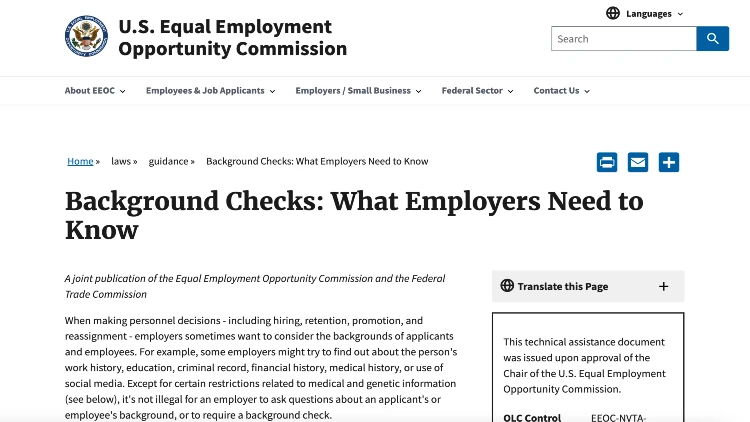
(Image: U.S. Equal Employment Opportunity Commission7)
The US Equal Employment Opportunity Commission (EEOC) asserts that it is illegal to run a background check on job applicants or employees to determine the person’s race, national origin, color, sex, religion, disability, genetic information (including family medical history), or age, and doing so can be considered discrimination.
An example of this type of discrimination is when an employer only asks people of a certain religion or race for information concerning their criminal or financial history. To ensure that discrimination does not occur, employers should treat everyone equally, and not request officials checks on only certain individuals, belonging to a specific group.
In most cases, it is illegal to request an applicant’s genetic information or family medical history, except in very rare circumstances. If an organization somehow obtains this information without consent, it cannot be used to make a hiring decision. Employers can only ask questions concerning personal medical history after a conditional job offer has been made if a medical condition could present safety risks in completing the job successfully. Other prohibited practices are outlined on the EEOC website.
If you believe you were discriminated against by an employer during the hiring process, you should contact the EEOC or call an attorney to discuss your rights and options in addressing this discrimination. The EEOC is a federal agency that ensures that employers remain in compliance with applicable laws.
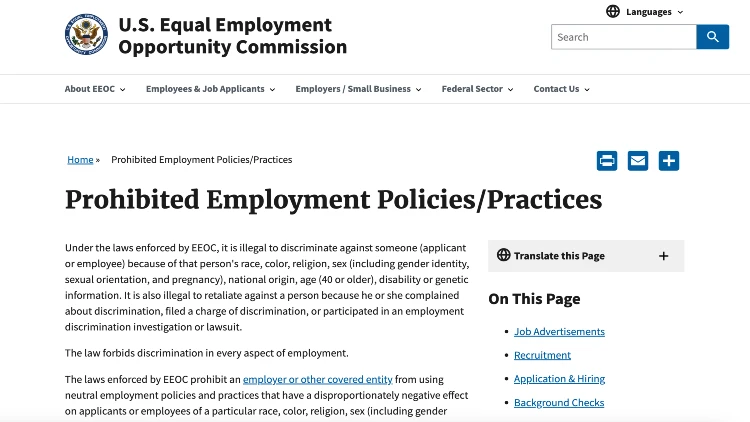
(Image: U.S. Equal Employment Opportunity Commission8)
Similarly, the Fair Credit Reporting Act (FCRA) protects the subjects of employment checks, by requiring employers to obtain approval before conducting a pre-employment background check.4 To do so, applicants typically sign a background check authorization form, so that the consent is on record. However, employers can also receive verbal permission to conduct a background check, even though it is preferred to have the verification of approval on paper. In some states, a signed agreement is required, so be sure to check with applicable state laws.3
Dangers of Violation (Can Someone Run a Background Check Without My Permission and Get Away With It?)
If an organization, landlord, or other entity runs a check on someone without consent, it can result in a lawsuit, as well as legal fines and penalties. However, it is important to know your rights in this situation, so you can take legal action if needed. If you are unsure of your rights, it may be wise to contact a lawyer, specifically one with experience in employment background checks.4
Similarly, if your employer runs a check that results in false information, you also have the right to dispute that information.4 Sometimes, cheaper background check websites result in inaccurate data and mismatched records, which can prevent you from passing the check. If you find that the information generated from employee background checks is false, you must contact the company that ran the check right away.
If your employers were to find something on your background check that led to them ending the job recruitment process, they are required by law to notify you. More specifically, they must provide a copy of the background report as well as a “Summary of Rights” to inform you on how to contact the organization that completed the report, in case there were any errors.
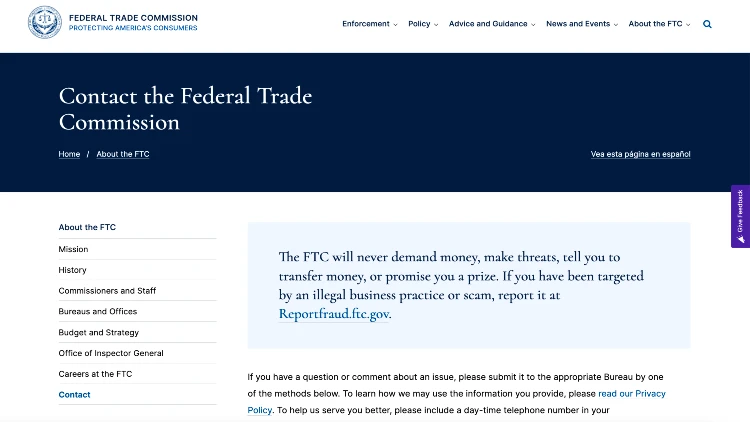
(Image: Federal Trade Commission9)
If the organization conducting the background check does not automatically provide one after denying you the job, ask them to do so. If they still do not comply, contact the Federal Trade Commission (FTC) immediately.
Even if a potential employer is not conducting a traditional criminal history check in Florida and other states you still have rights to ensure your privacy and protect your information. Under the Fair Credit Reporting Act (FCRA), employers must also seek permission before conducting a consumer credit report check. In many states, there are limits to this type of check. In these states, in order to obtain a consumer credit report, the job must be related to finances, law, or a similar field, and the organization must explain why obtaining this information is vital in the hiring process.
Potential employers may also conduct an “investigative report”, which could include personal interviews, social media checks, and other screening related to an individual’s character and reputation. Just like criminal background checks, employers need to seek permission to do so, according to national law.
However, there is some gray area concerning social media checks, since this may be technically considered public information in some states. One study shows that 73 percent of employers are not using social media to obtain background check information, as it is considered a controversial practice by many.5 While many may consider it a corporate overreach, a company could be held legally liable for a hiring incident which could have been prevented by obtaining public information found on social media.
Conducting background checks can be tricky business. Remember that anyone can conduct a background check for personal reasons without consent, while employers are legally required to receive consent before doing so. If an employer were to run background checks without the consent of employees, legal action could result.
It is important for job applicants, employers, and other individuals to understand the answer to the question, “Can Someone Run a Background Check Without my Permission?” in order to avoid legal violations and costly fines.
References
1University of South Florida. Background Check Procedures. Nd. 31 October 2021. Web. <https://usfweb.usf.edu/human-resources/resources/>
2Klazema, M. Backgroundchecks.com. How to Easily Do a Background Check on Someone. 5 April 2018. 31 October 2021. Web. <https://www.backgroundchecks.com/blog/how-to-easily-do-a-background-check-on-someone>
3HG.org. Employment Background Checks without Employee’s Permission. Nd. 31 October 2021. Web. <https://www.hg.org/legal-articles/employment-background-checks-without-employee-s-permission-41047>
4OneSource. Can I ever run a background check without permission? Nd. 31 Oct 2021. Web. <https://onesourcebackground.com/employee-background-check-industry-news-updates/background-check-permission>
5SHRM.Conducting Background Investigations and Reference Checks. 2021. 30 October 2021. Web. <https://www.shrm.org/resourcesandtools/tools-and-samples/toolkits/pages/conductingbackgroundinvestigations.aspx>
6EEOC Enforcement Guidance (2012, April 25). Enforcement Guidance on the Consideration of Arrest and Conviction Records in Employment Decisions under Title VII of the Civil Rights Act Issuing Authority. U.S. Equal Employment Opportunity Commission. Retrieved May 30, 2024, from <https://www.eeoc.gov/laws/guidance/enforcement-guidance-consideration-arrest-and-conviction-records-employment-decisions#IIIB>
7U.S. Equal Employment Opportunity Commission (2014, Mar 11). Background Checks: What Employers Need to Know. U.S. Equal Employment Opportunity Commission. Retrieved May 30, 2024, from <https://www.eeoc.gov/laws/guidance/background-checks-what-employers-need-know>
8U.S. Equal Employment Opportunity Commission (n.d.). Prohibited Employment Policies/Practices. U.S. Equal Employment Opportunity Commission. Retrieved May 30, 2024, from <https://www.eeoc.gov/prohibited-employment-policiespractices>
9Federal Trade Commission (n.d.). Contact the Federal Trade Commission. Federal Trade Commission. Retrieved May 30, 2024, from <https://www.ftc.gov/about-ftc/contact>
